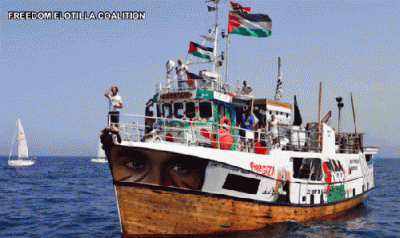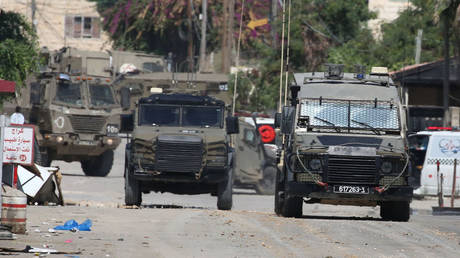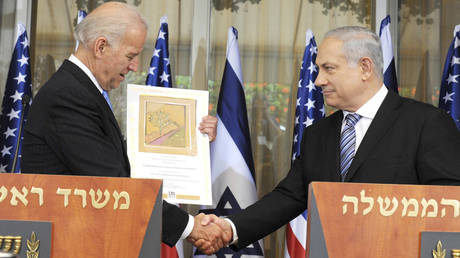The Freedom Flotilla and its Voyage to Gaza. Dimitri Lascaris

All Global Research articles can be read in 51 languages by activating the Translate Website button below the author’s name (only available in desktop version).
To receive Global Research’s Daily Newsletter (selected articles), click here.
Click the share button above to email/forward this article to your friends and colleagues. Follow us on Instagram and Twitter and subscribe to our Telegram Channel. Feel free to repost and share widely Global Research articles.
Global Research Wants to Hear From You!
***
This interview was recorded for the Global Research News Hour. Published May 18, 2024. Find a link here:
Dimitri Lascaris is a lawyer, journalist and activist.
After graduating from the University of Toronto Faculty of Law in 1991, Dimitri began his legal career at the Wall Street law firm of Sullivan & Cromwell, first working from the firm’s New York offices and then joining the firm’s offices in Paris, France.
Dimitri began his legal career at the Wall Street law firm of Sullivan & Cromwell, first working from the firm’s New York offices and then joining the firm’s offices in Paris, France.
In 2004, Dimitri joined one of Canada’s leading class action law firms, Siskinds LLP. While at Siskinds, Dimitri co-founded and led Canada’s largest and most accomplished team of securities class action lawyers. From 2004 to 2016, the Siskinds securities class actions team recovered more than $450 million for aggrieved investors.
In 2012, Dimitri was selected by Canadian Lawyer Magazine as one of the 25 most influential lawyers in Canada. In 2013, he was named by Canadian Business Magazine as one of the 50 most influential persons in Canadian business. Canadian Business Magazine described Dimitri as the “fiercest legal advocate for shareholder rights.” In 2023, Dimitri was nominated as one of Canadian Lawyer’s 25 most influential lawyers in Canada.
From 2012 to 2022, Dimitri was a correspondent and Board member of The Real News Network.
In March 2020, Dimitri announced his candidacy for the leadership of the Green Party of Canada. The leadership contest concluded in October 2020. Dimitri finished in second place out of eight candidates, garnering 45.5% of the votes on the eighth and final ballot.
In this interview, Dimitri talks about the trip on board the Freedom Flotilla he intends to take to Gaza in a few weeks, the obstacles it has faced, and the prospects of it being a successful action.
Global Research: Dimitri, the trip this year hit a snag in late April when the West African nation of Guinea-Bissau withdrew their flag from two of the ships on the grounds of extraordinary requests for information. One of those ships contained 5,000 tons of life-saving aid. You were present at the Freedom Flotilla’s press conference at which they declared Guinea-Bissau complicit alongside Israel in the deliberate starvation, siege, and genocide of Palestinians in Gaza.
Explain for our viewers, for our listeners, what made the actions of Guinea-Bissau authorities suspicious in the eyes of Freedom Flotilla members and why they think Israel had any involvement in influencing the situation.
Dimitri Lascaris: Well, I myself was not involved in communications with the authorities of Guinea-Bissau, so I’m limited in what I’ve been told by the organizers who were in contact with them. It’s my understanding that they learned that the Israeli authorities had made a request to the government of Guinea-Bissau to withdraw its flag from two of the three vessels that comprised the Flotilla.
The other one has a flag that is of a different country. In fact, it wasn’t 5,000 tons of humanitarian aid. It’s my understanding that there are, I believe, in excess of 50,000 tons of humanitarian aid.
It was a tremendous amount. These are sizable boats, and as they told us, the participants who had gathered in Istanbul waiting patiently for the boats to be authorized to leave for Gaza from Turkish waters, the response of the government of Guinea-Bissau to this request was to immediately insist upon inspecting the vessels, even though they had been thoroughly vetted already and were more than adequate to meet applicable standards, local law and international law. And so they immediately cooperated.
The organizers gave them complete access, had nothing to hide. And then before they completed their inspection, before the three inspectors who were sent to inspect the vessels completed their inspection within 24 hours, they sent a letter to the organizers saying, you know, we will allow you to retain the flag of Guinea-Bissau if you give us written confirmation that you aren’t going to go to Gaza. Or if you are going to go to Gaza, you have to have authorization from the port authority in Gaza.
The problem, as undoubtedly the government of Guinea-Bissau knows, is that there is no port authority in Gaza. Gaza doesn’t have a port because Israel won’t allow it to have a port. So the demand was effectively a refusal to allow the ship to go to Gaza with the flag of Guinea-Bissau.
At that stage, you know, even before they had an opportunity to respond. So how they get this demand, you know, for documentation and confirmation, the organizers, even before they had an opportunity to respond to this demand from the government of Guinea-Bissau, they get another communication and the government of Guinea-Bissau just announces we’re withdrawing our flag. They didn’t even wait for them to respond.
So that’s, at the current time, that’s where things stand. Two of the three vessels, well I should mention there has been an update. I understand, I haven’t spoken directly to all the organizers, but one of the organizers tells me that the government of Guinea-Bissau has now restored the flag to these two vessels, but apparently there are no assurances that it won’t withdraw the flag again.
And so no one is prepared to, you know, call all the participants back to Istanbul to prepare to leave after, you know, so many people came, hundreds of people came, went through non-violence training, waited for days, incurred expenses, to call them back when, you know, this has already happened. Guinea-Bissau has violated the trust of the organizers. It doesn’t make a lot of sense.
So they’re looking for another flag, and one of the countries they’re looking at is Ireland.
GR: Okay, so that just delays things. Isn’t it, you know, regardless of what Guinea-Bissau is doing, they’re still going to get around it, just take a little longer, right?
DL: That’s certainly, they are absolutely determined to sail to Gaza with that humanitarian aid, but they want, they don’t want this to happen again.
So we’re, they’re hoping that the Irish government will respond favourably to their request.
GR: Yeah, it seems to me that the Freedom Flotilla is united in spirit with all these campus protests cropping up really all over the world, not only desire to stop the genocide, but also taking a risk, you know, the campus protesters, you know, it could affect their careers and, you know, there are other risks as well. And you guys with the Freedom Flotilla are, you know, potentially risking your very lives.
I mean, because, I mean, you know, that on a past mission of the Freedom Flotilla back in 2010, Israelis boarded the ship bound for Gaza and killed 10 participants, and then also took several hostage for a time. And since then boats to Gaza have never gotten through due to Israeli interference. And yet what’s happening now is several times worse, because people all over Gaza, I mean, people in Rafah in particular are being bombed relentlessly.
A EuroMed human rights monitor found 140 mass graves containing the bodies of thousands of Palestinians. I mean, and they just say everything is because of what the Israelis say is, you know, basically, they blame everything on Hamas. I mean, including the murders of, you know, murdered journalists, doctors, patients even, and then say, well, you know, human shields or whatever.
So what I’m getting at is, what is the likelihood that once you get started, that you’re actually going to be able to get into Gaza to deliver aid?
DL: Well, it’s low. I mean, if we’re being honest with ourselves, the likelihood is low. I wouldn’t exclude the possibility because that would happen this time, because first of all, there are a lot of people on these boats, including people from elected officials from governments.
For example, there were a number of parliamentarians from Jordan, whose cooperation is extremely important to Israel, or I should say, collaboration is extremely important to Israel. So given the number of people, given their status, given their citizenship, you know, that’s going to be something that’s going to potentially cause the Israelis to allow the vessel through. The other thing that the Israelis have to be very mindful of is, you know, they are being prosecuted for genocide.
And one huge problem that they have is that their defense minister said at the very outset that they were going to starve the civilian population of Gaza. And the International Court of Justice, in ruling that it was plausible Israel was filing a genocide convention, referred to the statements of the defense minister and the practices of withholding aid. So this will be a very high profile, high visibility refusal of them to allow a large quantity of aid into Gaza, if they were to resort to prior practice and stop the vessel from entering, you know, the waters of Gaza.
And that would be incriminating at a time when they’re being prosecuted for, or I should say, you know, pursued, it’s not really a criminal prosecution at the International Court of Justice. But, you know, at the end of the day, they probably will stop us. But even then, we will be able to draw attention, the attention of the world to the obvious desire of the Israeli government to starve the population of Gaza.
GR: I know the freedom flotilla is unfortunately not mentioned very much in the Western media. However, I’m wondering what kind of attention it’s getting in Istanbul and in areas of that country, which is a lot closer to it and where people are more engaged with the Palestinians. I mean, what is the media aspects of it? And what is the general mood of the people in the area?
DL: Well, the general mood of the people is one of determination.
I think there’s people are very concerned about their safety. No one has any illusions about what the Israelis are capable of. I mean, they actually murdered seven workers of World Central Kitchen, six of whom were Western citizens.
And, you know, the head of the organization, this Spanish chef, was a good friend of Anthony Blinken and was actually quite pro-Israel in his public commentary up until that point in time. And yet they still killed six of his workers. So no one has any illusions.
People are taking this very seriously. As I say, that’s why there’s been so much non-violence training. But there’s a lot of high spirit of camaraderie, I think a steely determination to proceed and to overcome these obstacles.
And people were frankly quite saddened when we found out about the flag being withdrawn, despite the risks. So the press in that part of the world, Michael, I mean, it’s like night and day. I’ve been to Canada six weeks, a total of six weeks during this genocide, which began in October.
The rest of the time I’ve been in Eastern Mediterranean. And a good chunk of that time I was in West Asia. And how the press in this part of the world looks at this conflict and the extent to which it covers it is vastly different from what we’re seeing in Western countries.
And it’s really quite shameful. The mainstream press in the West has failed so miserably to rise to the occasion in the face of a Western backed genocide.
GR: Yeah.
And this wasn’t, wouldn’t be your first voyage on the freedom flotilla. It seems to me, you probably have a good idea of what to expect. But Dimitri, I’m afraid I’m going to have to leave you now.
But I wish you well on your voyage. And I hope and pray that whatever happens, you will make it and get out successfully and be able to get something to the people. And you’ll have plenty to share with us when your tour of Canada resumes.
So take care, my friend, and best wishes.
DL: Thank you, Michael. I appreciate it, my friend.



